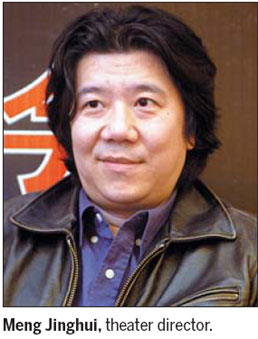Life and Leisure
Yilin Press brings out Pinter works in Chinese
By Mei Jia (China Daily)
Updated: 2010-10-19 07:56
 |
Large Medium Small |
British playwright Harold Pinter, the 2005 Nobel literature laureate, was a major influence on a generation of Chinese theater directors, including avant-garde director Meng Jinghui, some 20 years ago. But it's only now that his authorized works can be found in the country, thanks to the Jiangsu-based Yilin Press.
"We want to arouse interest in Pinter," says Liu Feng, Yilin' editor-in-chief, "because his plays offer a solution to some of society's ills."
The Chinese version of Pinter's works, released in September, is a two-volume collection that contains most of his major plays, speeches and essays, including The Dumb Waiter, The Homecoming and Betrayal. Its translator, Hua Ming, is an expert on Pinter and holds a PhD in theatrical works.
The books are a result of Yilin's efforts to win the trust of Pinter's agency. Although it has been looking at the Chinese market for a long time, it did not rush in, even in the midst of the Nobel fever in 2005, to make sure its publishing partner was one that fully understood the playwright.
Until the Yilin Press initiative, Pinter's plays in Chinese could occasionally be found in literary journals and introductory books on Western writers.

Meng says he read Pinter in one such book while still a student director at the Central Academy of Drama. It inspired him to stage The Dumb Waiter in 1990.
To commemorate the publication of Pinter's plays, Meng joined hands with the publisher to present a special Pinter Drama Festival at September's Beijing Fringe Festival, featuring eight Pinter plays.
"The newly rendered texts offered a chance to revisit the source of inspiration of my younger days," Meng says.
But Pinter's works are a challenge for both theater directors and audiences.
His use of haunting pauses to evoke a menacing atmosphere seldom appeals to mass audiences looking to be entertained.
Playwright Li Rong, with the Shanghai Drama Art Center, believes Pinter may still prove a challenge for theater-goers today. Li staged The Lover in 1991 and 2003, and says he believes few in the audience understood it fully.
Meng says while planning the Pinter Festival, many younger directors whom he tried showed their "inability to handle the nuances of the works".
Pei Kuishan is among the four more experienced ones, who finally made the cut.
Pei says he has been aware of the absence of Pinter's works on the nation's stage for years and admits it takes plenty of courage to take up his plays. "My courage comes from being dissatisfied with the current state of Chinese theater and my own previous efforts," Pei says. "I want (to do) dramas that question and test the audience, like Pinter's."
Unlike some works that leave no room for the director, Pei finds enough space for his own interpretation in the play, The Homecoming.
Literary critic and editor-in-chief of People's Literature magazine, Li Jingze, lauds the presentation of Pinter's works in books and on stage.
"The long pauses (in the plays) stands in sharp contrast to contemporary Chinese society, where there is much talk but not much meaning. But no one seems aware of this or the underlying power relations behind it."
China Daily